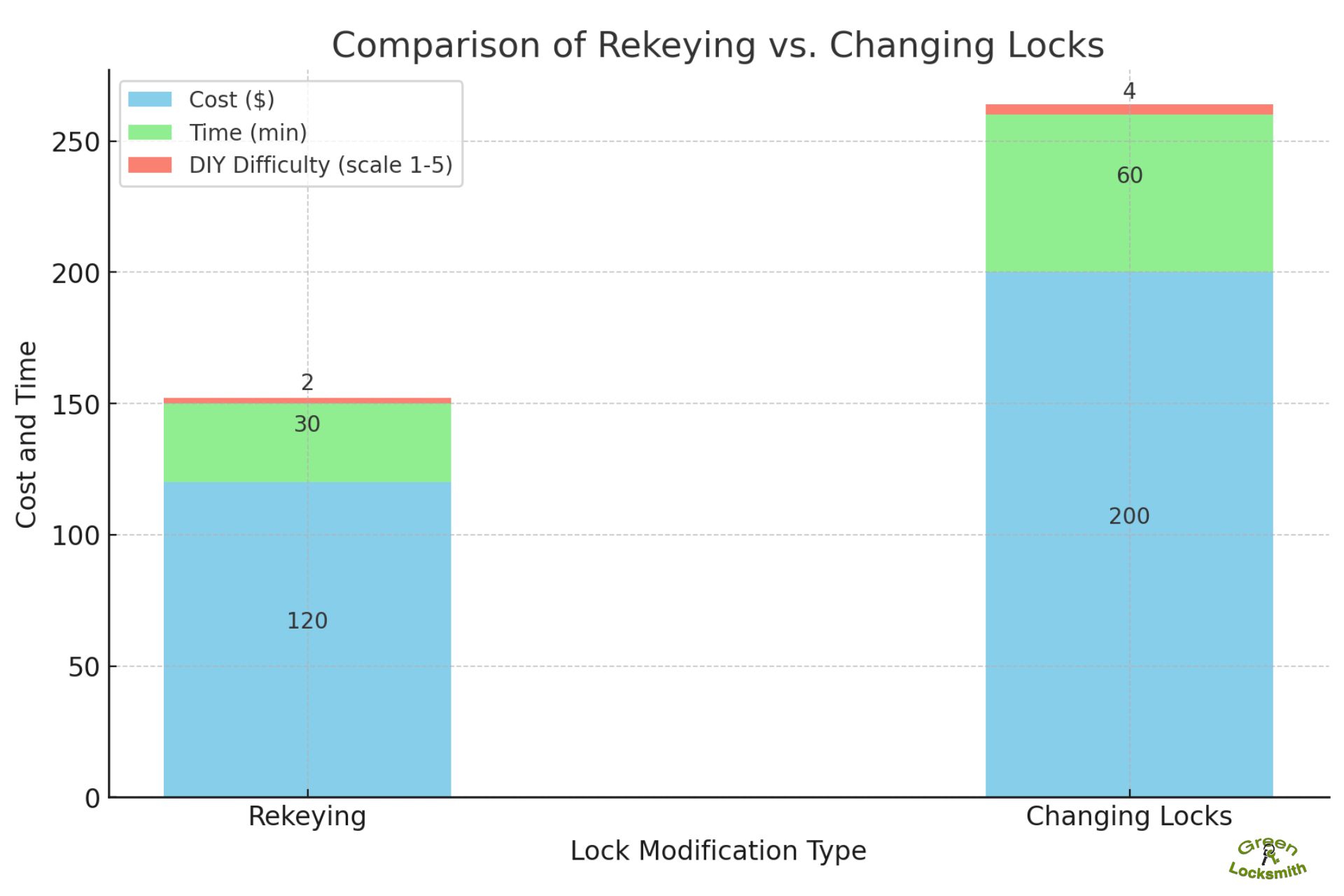So, you are wondering whether you should rekey your locks or change them completely. Maybe you just moved into a new place, or you lost your keys and need to make sure no one else can get into your home. We totally get it—keeping your home safe is super important. Let’s look at the details of rekeying versus changing locks, and by the end of this, you’ll know exactly what to do.
| Rekey or Change Locks: A Quick Guide | ||
|---|---|---|
| Criteria | Rekey Locks | Change Locks |
| Cost | $70 – $150 (total) | $70 – $200+ (total) |
| Time Required | 10-15 minutes per lock | 30-60 minutes per lock |
| Security Improvement | Maintains current lock security level | Can upgrade to higher security locks |
| When to Choose | Moved into a new house, lost keys, etc. | Old/worn-out locks, upgrade security |
| DIY Potential | Moderate difficulty | Higher difficulty |
| Eco-friendliness | Uses existing hardware | Replaces hardware |
What Does It Mean to Rekey Locks?
Alright, let’s start with rekeying. Imagine you have a lock, and instead of replacing the whole thing, you just change the internal pins so a new key works. That’s essentially what rekeying is. It’s like giving your old lock a fresh start without the cost of a full replacement.
When Should You Rekey?
When should you rekey? Well, it’s perfect for situations like moving into a new house where you want to ensure previous owners or tenants can’t stroll in with their old keys. It’s also great if you’ve lost a key and are worried it might fall into the wrong hands.
Advantages of Rekeying
One of the best things about rekeying is that it’s usually cheaper and quicker than changing locks. You get to keep your existing hardware, which can be a big plus if you’ve got some fancy or vintage locks you’re attached to. Plus, it’s an eco-friendly option since you’re not tossing out perfectly good locks.
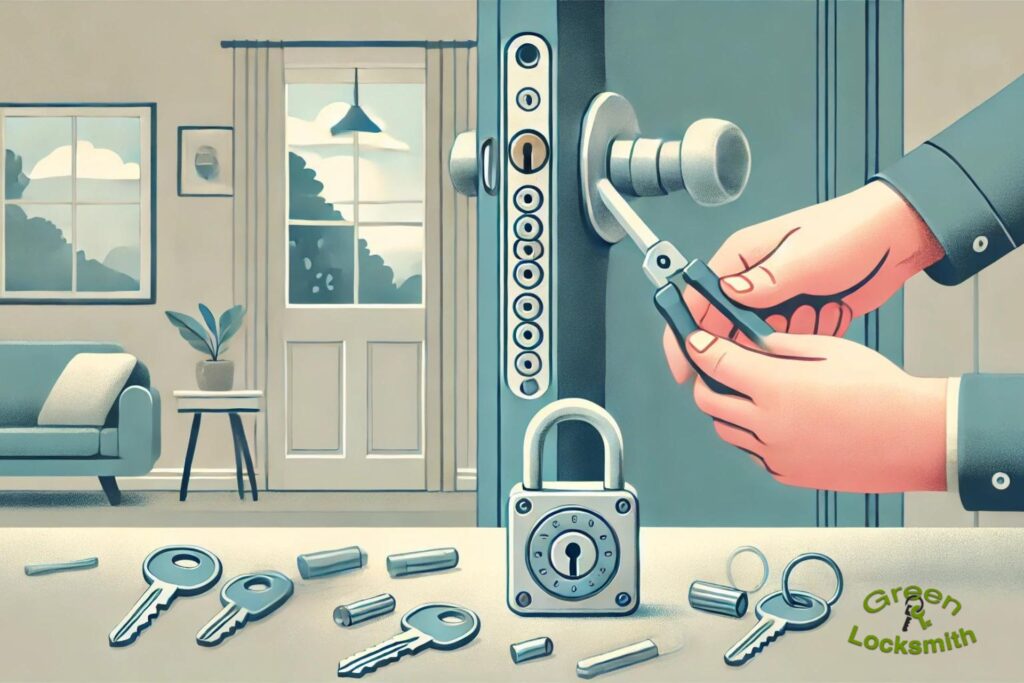
What Does It Mean to Change Locks?
Now, changing locks is exactly what it sounds like. You’re swapping out your old locks for new ones. This process can be a bit more involved because you’re removing the entire lock mechanism and replacing it with a new one.
When Should You Change Locks?
Why would you change locks? Well, it’s a solid choice if your locks are old and worn out or if you want to upgrade to a more secure or modern lock system. Maybe you’ve experienced a break-in and want to beef up your security. Or perhaps you’re just looking for a new look and feel for your doors.
Advantages of Changing Locks
Changing locks gives you the opportunity to enhance your home’s security with the latest lock technology. You can choose locks that match your style and provide additional features like smart locks, which offer keyless entry and remote access.
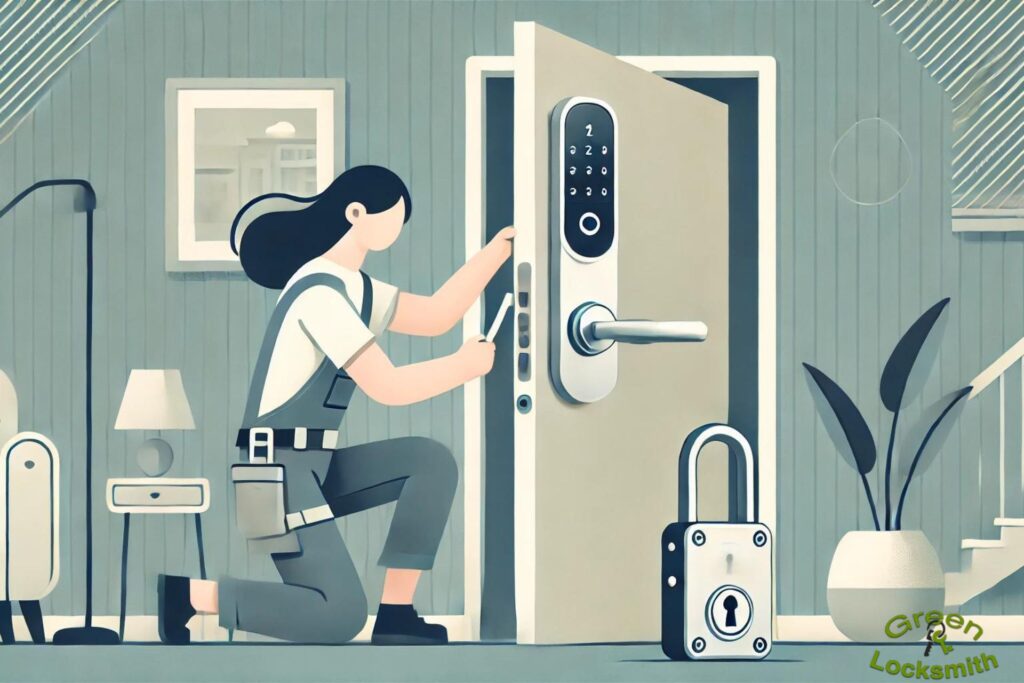
Cost Comparison: Rekeying vs. Changing Locks
Let’s talk money. Rekeying is generally cheaper than changing locks. When you rekey, you’re only paying for the labor and a new set of keys, which can run you anywhere from $20 to $50 per lock, depending on where you live and the complexity of the lock.
On the other hand, changing locks involves purchasing an entirely new lockset. Prices can vary widely based on the type of lock you choose. Basic locks can cost around $30, but high-security or smart locks can go upwards of $200 or more. Then, you’ve got to factor in the labor costs for installation, which can add another $50 to $100 per lock.
In a nutshell, if you’re looking to save some cash and your existing locks are in good shape, rekeying is the way to go. But if you’re aiming for upgraded security or a new style, changing locks might be worth the investment.
Time and Effort: Rekeying vs. Changing Locks
Time is money, as they say. Rekeying is typically quicker and less labor-intensive than changing locks. A professional locksmith can rekey a lock in about 10 to 15 minutes. If you’re handy and have the right tools, you might even be able to do it yourself.
Changing locks, however, can take a bit longer. Removing the old lock and installing a new one involves more steps and can take anywhere from 30 minutes to an hour per lock, especially if you’re upgrading to a more complex system.
If you’re pressed for time or want a hassle-free solution, rekeying is the more convenient option. But if you’re ready to put in a bit more effort for a complete upgrade, changing locks is a solid choice.
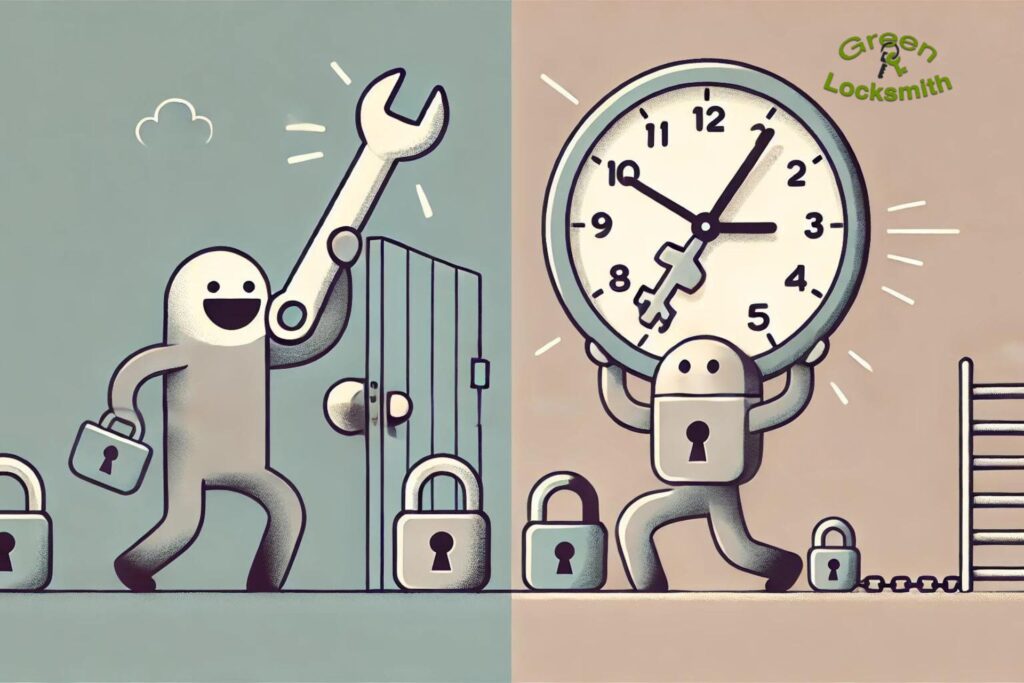
Security Implications: Rekeying vs. Changing Locks
Security is a biggie when deciding whether to rekey or change locks. Rekeying can restore your peace of mind by ensuring old keys no longer work, but it doesn’t change the basic security features of your existing locks.
If your locks are outdated or compromised, changing them can significantly boost your home’s security. Modern locks come with enhanced features like pick resistance, bump resistance, and smart technology, which can provide an extra layer of protection.
Think about your security needs. If you’re dealing with a high-risk situation or just want the latest and greatest in lock technology, changing locks is the way to go. But if your current locks are still solid, rekeying can be a quick and effective way to secure your home.
Quiz: Should You Rekey or Change Your Locks?
3 Key Factors to Consider When Deciding to Rekey or Change Locks
Now that we’ve covered the basics let’s break down the three key factors you should consider when deciding whether to rekey or change locks.
1. Cost Considerations
Budget is often the biggest factor in making this decision. If your wallet’s feeling a bit light, rekeying can be a real budget saver, especially if you’ve got more locks than a canal system. It’s your go-to for a cost-effective fix that doesn’t skimp on security.
But let’s say your locks are about as old as the jokes your uncle tells at family gatherings, or maybe you’re dealing with security hiccups more often than you’d like. In that case, it might be wise to bite the bullet and invest in some new hardware. Think of it as investing in a good night’s sleep, knowing your fortress is secure.
2. Time and Convenience
Consider how much time you’re willing to invest in this process. If you’re racing against the clock and just need a quick fix, rekeying might just be your saving grace. It’s generally a swift process—most locks can be rekeyed in the time it takes to brew your morning coffee. Perfect for when you need a speedy solution without the hassle.
If you’re ready for a weekend DIY project or your locks are worn out, consider changing them. It takes more effort as you replace old with new locks. If you’re up for the challenge or have a locksmith ready, it’s worth it. This method not only increases security but also modernizes your door hardware.
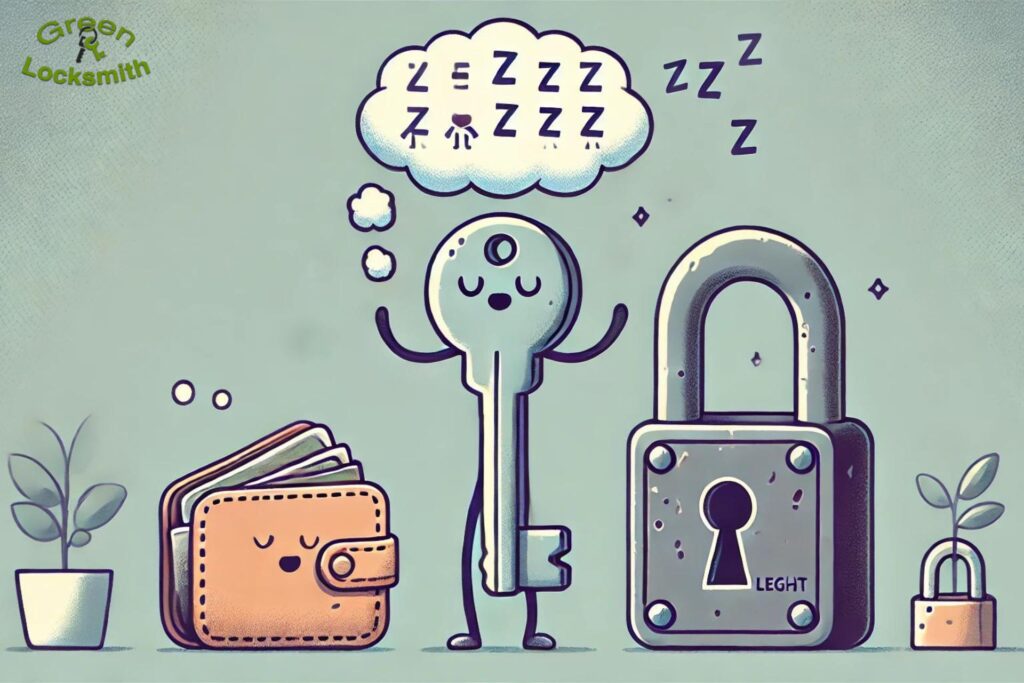
3. Security Needs
Finally, think about your specific security needs. Consider your security needs. If you need a quick fix, rekeying is your best bet. It’s a fast process—most locks can be rekeyed in the time it takes to make coffee. It’s great when you need a speedy solution.
If you have more time and your locks look old, changing your locks is a better option. It’s more work—you’ll be replacing old locks with new ones and maybe learning some DIY skills. But if you’re ready for it or have a locksmith, it’s worth the effort. It boosts your security and updates your door hardware.
Conclusion
When it comes down to it, deciding whether to rekey or swap out your locks entirely depends on what’s best for you and your situation. If you’re looking to save some cash and just need a quick fix, rekeying is a solid choice. It’s affordable and straightforward, perfect for when your current locks are still in good shape.
On the flip side, changing your locks is a bit pricier and takes more time, but it’s worth it if you’re aiming to boost your security or just want to change up how your home looks.
We hope this rundown has cleared up some of the confusion around rekeying versus changing locks. Remember, choosing the right option can help you sleep better at night. Got more questions? Need a hand from a pro? Just give us a shout—we’re here to keep you safe and sound!
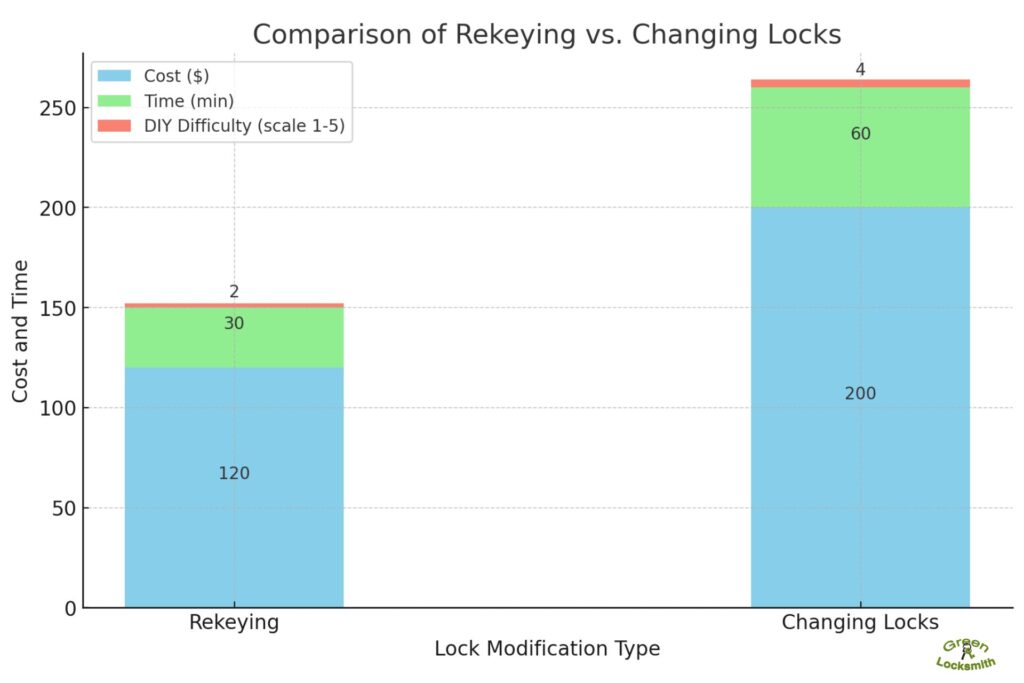
FAQs About Whether to Rekey or Change Locks
When should I rekey my locks instead of changing them?
You should think about rekeying your locks if they’re still working fine but you want to make sure old keys can’t open them anymore. This is a good idea if you’ve just moved into a new place, lost your keys, or if you’re worried about who else might have a key to your home. Rekeying lets you update your locks so only you and people you trust can get in, without having to replace the whole lock.
How much does it typically cost to rekey or change locks?
For rekeying, where we tweak your lock so it works with a new key, you can expect to pay around $70 to $100 as a locksmith service fee, plus about $20 to $50 per lock. It’s a quick, wallet-friendly option when you just need a key change.
If you’re looking to switch out your locks completely, the initial service call might be the same, but changing locks usually costs a bit more for the labor—think around $40 to $100 per lock, depending on the type of lock you choose. This doesn’t include the cost of the locks themselves.
Does rekeying locks provide the same level of security as changing locks?
Rekeying can be just as secure as getting new locks as long as your current locks are still strong and work well. However, if you switch to new, modern locks with extra features like being harder to pick and smart technology, your security can get even better.
How long does it take to rekey or change locks?
Rekeying a lock usually takes about 10 to 15 minutes for each lock. Changing a lock might take longer, from 30 minutes to an hour for each one, depending on how complex the lock is and how hard it is to install it.
Can I rekey or change the locks myself, or should I hire a professional?
You can rekey or change locks yourself if you have the necessary tools and skills. However, hiring a professional locksmith can ensure the job is done correctly and efficiently, especially for more complex lock systems or if you want to upgrade to high-security or smart locks.
